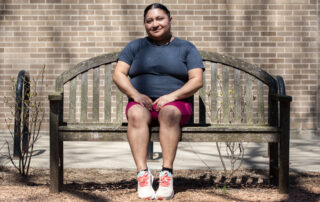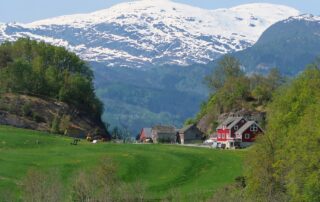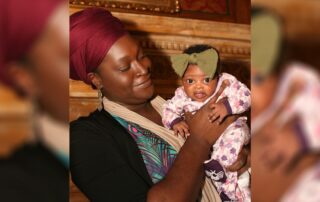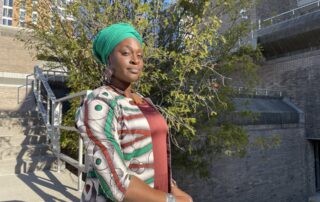Asifa Quraishi-Landes is a law professor at the University of Wisconsin-Madison. Quraishi-Landes says she’s “always liked learning” and believes “education is something that gives people tools to be better.”
She’s known on campus for using untraditional ways of teaching in her lectures. She brings her classes to life by encouraging her students to participate in role-playing scenarios and act as Alexander Hamilton, Thomas Jefferson, Ruth Bader Ginsburg, Antonin Scalia, among others. She says it allows the students to see things from a different perspective.
Her passion for education was fostered at a young age. She credits her upbringing and parents’ mixed, multifaith, activist-rooted background. Her father was born in Jaipur, India, and soon after migrated to Pakistan during partition. She says his goal was to become a genius economist and that led him to Stanford University to pursue his MBA. That’s where he met Quraishi-Landes’ mother – a white Methodist who was exploring spirituality and eventually found Islam. Together, they started many early institutions for American Muslims in the 1960s – before Quraishi-Landes was born. These institutions helped Muslims navigate and organize into American society as a minority faith community.
Quraishi-Landes describes her journey to Wisconsin as “unexpected.” She knew she wanted to teach constitutional and Islamic law. She recalls feeling incredibly impressed with Madison, seeing social justice awareness issues on campus and in town as “something people cared about and could talk about.” It’s a nod to the Wisconsin Idea, which when she first heard about it, realized it’s an Islamic idea. She says they align with the intention that “knowledge built at the university is a trust that is owned by the people of Wisconsin.” To her, education is something to be shared.
Witnessing Islamophobic environments, anti-sharia legislation and a rise in hate crimes, she realized there’s a need for the work she’s doing. She admits “Sharia” has gained a negative connotation and describes it as a “scary word” to many Americans, including those in Wisconsin. She defines it as “a series of guidelines on how to live life.”
Breaking down the etymology, with “sharia” meaning “street or way,” so for her and Muslims, it’s “God’s way to live.” She recalls getting her hijab pulled off in high school because her classmates thought it was funny. That’s why she makes it her goal to connect with young people to get them inspired by knowledge and channel it into being productive citizens.
She’s involved in organizing Madison Oasis, a third space group that hosts monthly potluck dinners and topics of conversation with expert speakers. She describes it as a “cross section” of people’s interests in the American Muslim community that explores intersectionality.
“I grew up opening my home to as many people as possible,” she said, “and makes me feel connected to the community.”
Nationally, she helps run an initiative her parents started called the Muslim Public Service Network. Its aim is to get young Muslim Americans into policymaking and civic engagement by providing them free room and board while they complete internships on the hill.
Quraishi-Landes stresses the responsibility of American Muslims to “help the greater good of the country.” She adds that Muslims are encouraged to “follow the law of the land” of where they are. She hopes the American reaction to Muslims in the United States would be ‘oh good, the Muslims are here! They’re always caring about everybody,’ and believes that they’d be better understood as citizens of the country if that was more well known.
This work is part The Wisconsin Muslim Project from PBS Wisconsin, a project supported by the Doris Duke Foundation through the Building Bridges Program. The mission of the Building Bridges Program is to support national efforts, working with U.S. Muslims, to increase mutual understanding and well-being among diverse populations for the benefit of building stronger, inclusive communities.










